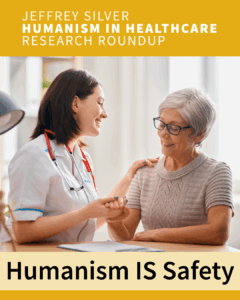 This post is part of our series of Research Roundups — a list of recently published studies on humanism in healthcare. If you would like to be notified each time a Research Roundup is published, send an email to bking@gold-foundation.org with the subject line “Subscribe RR”.
This post is part of our series of Research Roundups — a list of recently published studies on humanism in healthcare. If you would like to be notified each time a Research Roundup is published, send an email to bking@gold-foundation.org with the subject line “Subscribe RR”.
Publications from Gold Foundation-Affiliated Authors
The Gold–Hope Tang, MD 2015 Humanism in Medicine Essay Contest — Third Place: Gauze and Guns
Gridley, S. Acad Med. 2015;90:1356–1357.
Samantha was the third place winner of the Gold-Hope Tang, MD 2015 Humanism in Medicine Essay Contest
“My team erupted into laughter at this apparently hilarious revelation of our patient’s most protected secret, while standing just a few yards away from the room where the same patient lay waiting for our care. I stood dumbstruck by his insensitivity, but my cowardice stifled the retort I would later kick myself for not saying.”
Educating for the 21st-century health care system: An interdependent framework of basic, clinical, and systems sciences
Gonzalo JD, Haidet P, Papp KK, Wolpaw DR, Moser E, Wittenstein RD, Wolpaw T. Acad Med. 2015 Oct 16.
Paul Haidet, MD received a 2013 Mapping the Landscape grant
In this article, authors propose a new framework for educating physicians in adapting to and practicing in systems-based environments. The model they propose allows students to engage in authentic, value-added, and patient-centered roles as navigators within the health care system.
Medical students’ professionalism narratives reveal that experiences with death, dying, or palliative care are more positive than other experiences during their internal medicine clerkship
Cripe LD, Hedrick DG, Rand KL, Burns D, Banno D, Cottingham A, Litzelman D, Hoffmann ML, Martenyi N, Frankel RM. Am J Hosp Palliat Care. 2015 Sep 30.
Rich Frankel, PhD is a member of the steering committee for Mapping the Landscape
Authors identified essays about death, dying and palliative care (DDPC), as well as control essays, from a sample of over 4,000 third-year medical student professionalism narratives. Analysis suggests that student preparedness for primary palliative care may be improved by addressing the common professionalism challenges of clinical clerkships.
Surgical specialty residents more likely to receive the Arnold P. Gold Humanism and Excellence in Teaching Award
Falcone JL. J Surg Educ. 2015 Oct 1.
John Falcone, MD, MS is a past recipient of a HETA Award
The Arnold P. Gold Humanism and Excellence in Teaching Awards are given by medical students to residents. In an analysis of award winners, Falcone found that the specialties most commonly awarded were General Surgery (22.3%), Internal Medicine (20.9%), and Obstetrics/Gynecology (20.4%).
Health literacy in transitions of care: An innovative objective structured clinical examination for fourth-year medical students in an internship preparation course
Bloom-Feshbach K, Casey D, Schulson L, Gliatto P, Giftos J, Karani R. J Gen Intern Med. 2015 Oct 9.
This team was given a Gold Foundation grant in 2012 for this project
Authors developed and tested an Objective Structured Clinical Examination (OSCE) for medical students to learn how to better work with patients of low health literacy. 50+ students participated in a workshop about health literacy before the OSCE and 40+ students participated in the workshop after the OSCE. Those who completed the workshop before teh workshop outperformed their peers during the OSCE. 82% of participating students felt confident communicating with patients of low health literacy after the workshop and OSCE.
Other Publications
Three things to do with stories: Using literature in medical, health professions, and interprofessional education
Blackie M, Wear D. Acad Med. 2015;90:1309-1313.
Though many medical schools have activities related to “literature and medicine”, the concept is elusive with no commonly understood definition. In this article, the authors present three uses for literature in medical, health professions, and interprofessional education: close reading, ethical or moral inquiry, and drawing illustrations. Summaries and examples of these approaches are provided.
Predictors and outcomes of burnout in primary care physicians
Rabatin J, Williams E, Baier Manwell L, Schwartz MD, Brown RL, Linzer M. J Prim Care Community Health. 2015 Sep 28.
Researchers examined data from surveys of 400+ family physicians and general internists as well as a chart audit of their adult patients with diabetes and/or hypertension. They found that burnout is highly associated with adverse work conditions and a greater intention to leave the practice, but not with adverse patient outcomes. Care quality thus appears to be preserved at great personal cost to primary care physicians.
A qualitative study of key stakeholders’ perspectives on compassion in healthcare and the development of a framework for compassionate interpersonal relations
Kneafsey R, Brown S, Sein K, Chamley C, Parsons J. J Clin Nurs. 2015 Sep 25.
Forty-five academic staff, health care students, clinicians and service users participated in 9 focus groups where they were asked to define compassion in the context of health care. While participants recognized the pressures of healthcare work and accepted that “consistent compassion” was not necessarily realistic, it was still seen as an important goal. Authors created the “Framework for Compassionate Inter-personal Relations” to promote reflection on the implementation of compassionate practice.
The self-efficacy in patient-centeredness questionnaire – a new measure of medical student and physician confidence in exhibiting patient-centered behaviors
Zachariae R, O’Connor M, Lassesen B, Olesen M, Kjær LB, Thygesen M, Mørcke AM. BMC Med Educ. 2015 Sep
Researchers developed a questionnaire assessing medical student and physician self-efficacy in patient-centeredness (SEPCQ) and explored its psychometric properties. The 27 item questionnaire focuses on exploring the patient perspective, sharing information and power, and dealing with communicative challenges. The SEPCQ-27 showed satisfactory psychometric properties, and preliminary support was found for its construct validity.
 This post was written by Brandy King, Head of Information Services at The Arnold P. Gold Foundation Research Institute
This post was written by Brandy King, Head of Information Services at The Arnold P. Gold Foundation Research Institute


